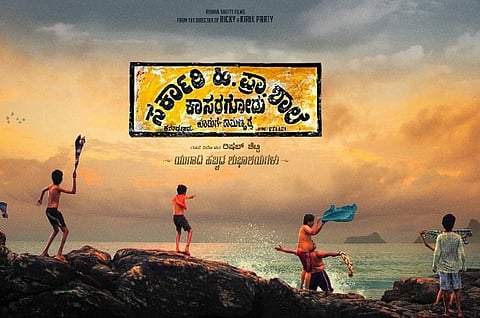

'Sarakari Hiriya Prathamika Shale, Kasargod, Koduge: Ramanna Rai', the title of the recently released Kannada film, is quite a mouthful. Referred to as SHPSK, the film by Rishab Shetty of Kirik Party fame, does not easily roll off the tongue but has received rave reviews from audiences and critics alike since its release on August 24.
The film, Rishab's third directorial venture, depicts the struggle of children attempting to save a Kannada school in Kasargod, a town in Kerala which is near the Kerala-Karnataka border, from shutting down. It delves into the complex linguistic identities of the residents of Karnataka's border areas with Kerala. Some offer violent remedies to save the school, others contemplate cunning diplomacy while a few even wonder about learning a new language - Malayalam.
But ask its director Rishab Shetty and he will tell you that the story is not about Kasargod or about the suppression of minority voices.
"I simply wanted to tell the story of Kannada schools shutting down after a few such news stories appeared in the media. I wanted to do a film on the children in these schools and wrote a completely fictional story, drawing inspiration from real-life characters and changing them for cinematic purposes," he explains.
Children are at the heart of Rishab's film. The film opens by introducing the audience to the characters, sights and sounds of Kasargod through the eyes of Mammootty and Praveena, a pair of seventh standard students at the local government primary school. Praveena's attempts to impress his classmate Pallavi draw a few laughs but it is his friends Sampath and Mahendra who leave the audience in splits with their timely pranks.
The director puts down the delectable charm of the film's opening sequences to personal experiences.
"I have brought characters from my childhood to the film, Mammootty is based on how I used to be in my childhood and Praveena is based on my brother," says Rishab, who also admitted that attempts to save the government school in Keradi, a village in Kundapur taluk of Udupi district, where he grew up, also play a part in the film.
Rishab Shetty (left) with cast members of SHPSK | Photograph Courtesy: Rishab Shetty Films
The children's enthusiasm and innocence drive the first half of the film, making it an enjoyable watch. It also depicts the lives of residents of the coastal region with picturesque shots of the seas and glimpses of Yakshagana, Hulivesha (tiger dance) and other art forms popular in the region. The scenes are another reminder of a trend in Kannada cinema in the last few years popularised by Rakshit Shetty's Ulidavaru Kandanthe set in Udupi and Anup Bhandary's Rangitharanga set in Dakshina Kannada.
The film is ably supported by quirky characters like Bhujanga, played by Prakash Thuminad, who is always on the lookout for food, and Upadhyaya, played by Pramod Shetty, who is always on the brink of violence, usually at Bhujanga's expense. The narrative is affected by the local touch in the dialogues and exchanges among the characters but is also hampered by a lack of strong female characters. In fact, the teachers in the school are mostly male and the residents, including the children who lead the efforts to save the school, are male. The female characters in the film are restricted to Pallavi and her mother.
Nevertheless, the timely placement of songs by Vasuki Vaibhav, which have racked up over a million views on YouTube, keep the plotline ticking along.
SHPSK also touches upon the history of Kasargod, a town 45 km south of Mangaluru in Dakshina Kannada. It was earlier part of the South Canara district of the Madras Presidency under the British, but it continued to be included in the Dakshina Kannada district in Karnataka after Independence. It was only in 1956 when the states were reorganised on linguistic lines, that Kasargod was merged with Kerala.
Rishab makes subtle references to the town's history but manages to keep the focus of the film on linguistic identity rather than explore the political tensions in the town. "Shutting down of Kannada schools is a serious subject and the history of Kasargod is a sensitive issue," explains Rishab.
The director prepared extensively for the film, spending six months in Kasargod speaking to lecturers, activists and residents in the region. "We held auditions there for forty days, and selected child actors for the film. We then held acting workshops for them before shooting the film," he says.
For the sake of clarity, Tulu, another popular language in the region is used minimally. "We had to stick to the core storyline, that of saving a Kannada school," he admits.
It is in the attempts to save the school that the film reaches its peak but also meanders aimlessly. The film suffers in the second half as the children take a backseat and a court case to save the school takes centre-stage. But the narrative recovers quickly to drive home the message of the importance of saving Kannada, through the assured screen presence of Anant Nag.
A still from the film | Photograph Courtesy: Rishab Shetty Films
Rishab is not too worried by his detractors. "I did not set out to shoot a documentary to explore all aspects of the topics I have touched upon. If I tried to tell the story seriously, it would backfire on me or turn it into a documentary film. I had to balance seriousness with lightness and feel-good factor and deliver entertainment to the audience," he says.
If it was a feel-good entertainer he was going for, then SHPSK has certainly delivered. While the film preaches the values of Kannada, Rishab tries to strike a balance with a few characters even wondering about learning Malayalam.
"Malayalis are not wrong. I have tried to balance the voices in the script but in the end, it is quite simply about the attempts to save a Kannada school," he adds.